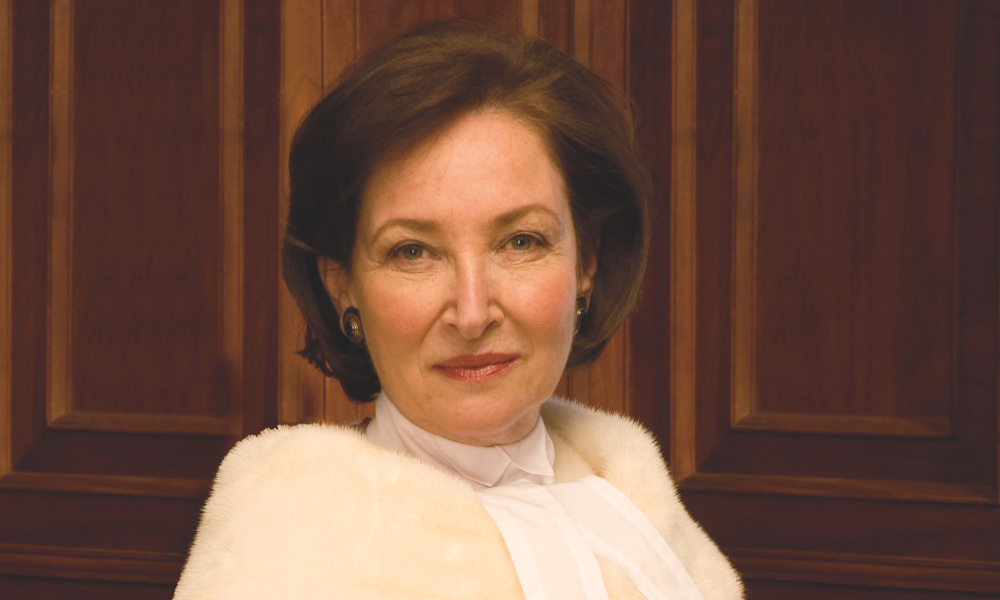
One panel will examine her often overlooked impact on privacy law, says lawyer

While her contributions to administrative law and equality are prominent in discussions of Justice Rosalie Silberman Abella’s judicial legacy, Gerald Chan says there is not enough focus on her impact on privacy.
Chan, a partner at Stockwoods LLP and former clerk to Justice Abella, says she has often been the court’s “most progressive voice for taking a robust view of what s. 8 of the Charter protects when it comes to our reasonable expectations of privacy.” One example is the 1994 Ontario Court of Appeal ruling in R. v. Edwards. In her dissent, Justice Abella said the trial judge had erred by concluding that because the accused did not live in the apartment where police arrested him, he had no standing to assert a privacy interest protecting him from unreasonable search and seizure.
“She said yes in that case,” says Chan. “The Supreme Court ultimately said no, in a decision that has later been criticized for taking too cramped a view of the privacy right.”
Justice Abella again stood in contrast to the SCC in R. v. Tessling in 2003. She wrote the decision that the police use of forward-looking infra-red aerial camera technology, which detects heat emanating from homes from an airplane flying overhead, was a s. 8 breach. Finding the evidence against him should be excluded, the court acquitted the accused, who police had arrested for production and trafficking of marijuana. An SCC majority overturned the decision.
“The one that I would really highlight is her opinion in Telus,” says Chan. In 2013’s R. v. TELUS Communications Co., the SCC found that police needed a wiretap authorization to have the telecom give them text messages sent between two people on an ongoing basis. The statutory interpretation case asked whether intercepting texts was akin to listening in on a phone call. Justice Abella ruled that the methods were equivalent because nowadays, many people text more than talk over the phone.
“If you take a purposive view of the law and what it’s intended to protect, then the fact that these conversations are taking place over text as opposed to oral over the phone should not make a difference as to the application of that law,” says Chan.
“That was a very significant decision. I don’t think it’s talked about enough.”
Chan will participate in a panel discussing Justice Abella’s effect on privacy and criminal law at “The Honourable Rosalie Silberman Abella – A Life of Firsts,” a conference in Ottawa on May 12 and 13. The conference will celebrate these and Justice Abella’s various other legal and non-legal impacts on Canadian society and the world. The uOttawa Public Law Centre, the Canadian Institute for the Administration of Justice (CIAJ), the Human Rights Research and Education Centre, and The Advocates’ Society organized the event, which will take place online and in person. Online attendance for full-time students is free.
“Justice Abella has firmly, in her core being, a fine understanding of concepts of equality,” says CIAJ president and Manitoba Court of Queen’s Bench Justice Colleen Suche. “She brings that lens and brings that deep, rich understanding of what equality means to many areas.”
As sole commissioner of the 1983 federal Royal Commission Equality in Employment, Justice Abella created the concept of employment equity. The SCC adopted the report’s development of the theories of equality and discrimination in its first decision dealing with equality rights under the Charter, and the governments of Canada, New Zealand, Northern Ireland and South Africa have implemented the report in their own countries.
“We have many judges who are greatly respected, specifically with respect to their judicial roles,” says Justice Suche. “But hers goes beyond that. It’s her place in the larger world with respect to issues of equality and human rights. I think that’s a very remarkable thing.”
Before helping to cultivate how Canada and the world viewed the concept of equality, Justice Abella was born in 1946 in a Displaced Person’s Camp in Stuttgart, Germany. Her family arrived in Canada as refugees in 1950. After joining the Ontario Bar in 1972, she was appointed to the Ontario Family Court at 29 as the youngest – and first pregnant – person appointed to the Canadian judiciary.
Being among the first generation of female judicial leaders, Justice Abella has been a role model who has “spoken passionately about the importance of women being part of both the profession and the judiciary,” says Justice Suche. An Advocates’ Society sponsored panel at 3:30 pm on Thursday will discuss Justice Abella’s “trailblazing career” and its significance for women in the legal profession.
There are also panels examining Justice Abella’s global impact, non-legal influences, jurisprudence in administrative, human rights, international, constitutional and labour law, and how her jurisprudence will continue to shape Canadian law.